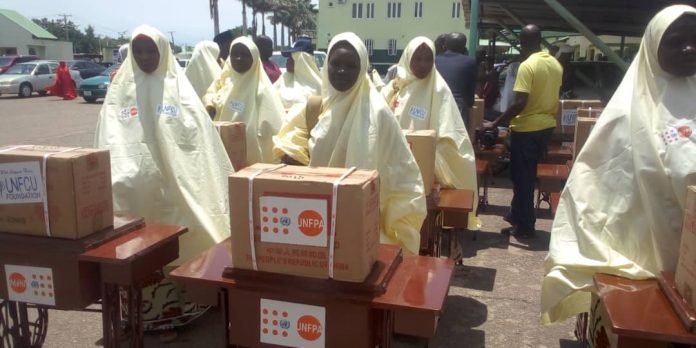By Abubakar Rabilu Gombe
In a transformative initiative aimed at restoring dignity and providing sustainable livelihoods, over fifty survivors of Vesicovaginal Fistula (VVF) in Gombe State have been empowered with vocational training and essential equipment, thanks to the collaborative efforts of the Norwegian government, the United Nations Population Fund (UNFPA), and the Fistula Foundation.
The graduation ceremony, held at the Gombe State Specialist Hospital, marked a pivotal moment for these women who, after undergoing successful surgeries, are now poised to rebuild their lives. The survivors, many of whom had been ostracized by their communities due to their condition, now have the tools and skills necessary to become economically independent.
Dr. Garba Muhammad Buwa, the VVF Desk Officer at Gombe State Specialist Hospital, expressed profound gratitude to the Norwegian government and UNFPA for their unwavering support. He emphasized that this partnership, facilitated by the Fistula Foundation, not only funded the life-saving surgeries but also went a step further by providing vocational training to help the survivors regain their financial independence.
“The partnership with the Norwegian government, UNFPA, and the Fistula Foundation has been nothing short of transformative,” Dr. Buwa said. “This initiative is about more than just surgeries. It is about restoring hope and giving these women a second chance at life. After suffering for so long, they now have the skills and tools to support themselves and their families.”
He also commended Governor Muhammad Inuwa Yahaya of Gombe State for his role in creating an enabling environment that made the surgeries and subsequent training possible. According to Dr. Buwa, Governor Yahaya has been a staunch advocate for healthcare improvements in the state, consistently welcoming partnerships that aim to better the lives of Gombe’s citizens.
“Governor Yahaya has always made it clear that Gombe State is open to any partnership that seeks to improve healthcare delivery,” Dr. Buwa continued. “He has provided the leadership necessary to ensure that initiatives like this can flourish. We are extremely grateful for his support and that of the hospital management.”
In a call for more collaborative efforts, Dr. Buwa revealed that 80 percent of the VVF survivors who benefited from the program were from Gombe State, while the remaining participants hailed from neighboring states. He stressed the need for more partners to join hands in expanding the scope of such life-changing interventions, especially for vulnerable women across the region.
The Commissioner for Women Affairs, Asma’u Iganus, was also present at the ceremony. She hailed the initiative as a significant step towards improving the lives of women who have suffered in silence for years due to VVF. Commissioner Iganus encouraged the beneficiaries to make full use of the equipment provided, stressing the importance of building sustainable livelihoods and warning against selling the items.
“The tools and training you have received today are your keys to a brighter future,” Commissioner Iganus said. “Do not be tempted to sell them. Instead, use them to build a life for yourselves and your families. You have been given the chance to regain your dignity, and I urge you to make the most of it.”
In the same vein, Mrs. Irudia Mamman, Chairperson of the Women Farmers Association, echoed the Commissioner’s sentiments, encouraging the women to use their newfound skills to improve their livelihoods. She pointed out that with dedication and hard work, they could overcome their past struggles and build a successful future.
During the event, several beneficiaries shared their personal stories, shedding light on the emotional and physical toll VVF had taken on their lives. Zainab Kabiru, a survivor from Gombe, and Hauwa Abdullahi, from Biu Local Government in Borno State, recounted their long and painful journeys with VVF, which had lasted over a year in each case. Both women expressed immense relief after their surgeries and spoke of their hopes for the future now that they had been given the tools to start afresh.
“I thought my life was over,” Zainab said tearfully. “For over a year, I could barely face my community. But now, thanks to the surgery and the training I received, I feel like I have been given a second chance. I am ready to move forward.”
Hauwa, also emotional, added, “I lived with this condition for so long that I had forgotten what it was like to feel normal. Today, I stand before you as a survivor, ready to start my own business and contribute to my community.”
The survivors received equipment such as sewing machines, grinding machines, popcorn machines, and some were even provided with two goats each to help them establish small-scale businesses. In addition to this, each woman received a transport fare of twenty-five thousand naira to aid their transition back to their communities.
The initiative’s holistic approach, combining medical care with vocational training, is a model for how to effectively support VVF survivors, ensuring that they do not only recover physically but are also empowered to rebuild their lives economically and socially. The provision of equipment such as sewing machines and goats ensures that these women can embark on sustainable ventures, providing for their families and reintegrating into society with dignity.
This program stands as a beacon of hope for countless other women across Nigeria who continue to suffer in silence. The collaboration between the Norwegian government, UNFPA, and the Fistula Foundation demonstrates the power of partnerships in driving meaningful change. With the support of the Gombe State government and other key stakeholders, this initiative is paving the way for a future where no woman has to suffer the indignity of VVF in isolation.
As the event concluded, there was a palpable sense of optimism among the beneficiaries and stakeholders alike. With tools in hand and newfound skills, these women are ready to embark on a journey of recovery, independence, and empowerment.


